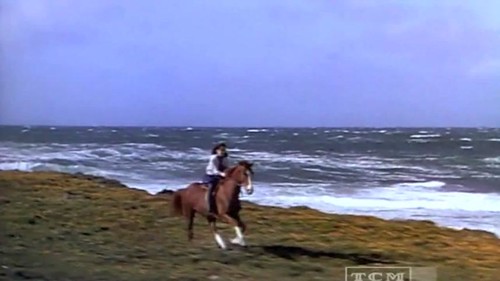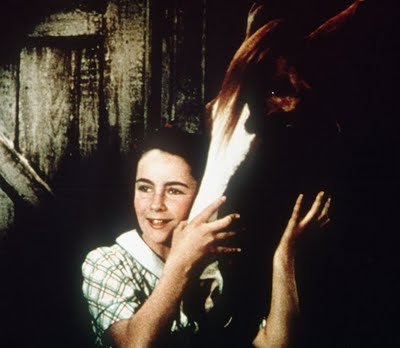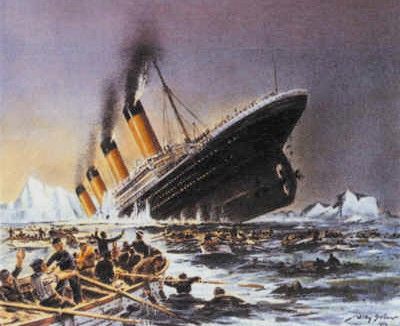Now, most of you guys are going to see
The Hunger Games, and you're probably thinking that we aren't that obsessed and crazed with a bloody and devastating sport as the characters in that awesome movie do. You're wrong as we keep our eyes glued to televised sporting events like football, soccer, boxing, wrestling, car racing and of course hunting/fishing. This makes our judgment seems weak, but at least we have rules for those types and it's much safer today than back then. Especially, when you consider that long ago, (and still today) many people thought that hunting was the greatest sport ever, despite the billions of animals, (and some random humans) that have died in it. (If a sport is deadly, don't say that it's the greatest thing ever. Otherwise, you'd be saying that Dick Cheney shot that guy in self-defense.)
Maybe we like pain and torture when they,or we, hunted for food or for pointless trophies. But, whatever the case, be glad that you weren't playing with General Zaroff in Richard Connell's classic tale that makes us reconsider about what the hunted feels like. This tale is so well beloved that Hollywood seems to remake/spoof/remix this every single decade, and it all started with this 1932 chiller from the same guys that brought you the masterpiece,
King Kong. That's right. M.C.Cooper produced, Fay Wray and Robert Armstrong starred,and Max Steiner composed this puppy just one year prior to that other masterpiece. Heck, even this was filmed on the same sound set and studio as
Kong. Now, let's take a look at this one strange and crazy movie.
On one dark and not-so-stormy night, Bob Rainsford (played by Joel McCrea) is traveling on board a cabin cruiser, and he's a famed hunter who believes that the hunted likes being hunted, and the hunters (like him) loves being the hunter.
Yeah, right. However, before he can go on his merry little way, the ship sails through a channel near an island. This turns out to be a bad idea because it suddenly explodes and sinks.
Yes! I'm a huge fan of shipwrecks, so I love this sequence even though there's no such thing in the story. :) Tragically, Rainsford is the only one left alive, and he washes upon the deserted island.
Sadly, it's not populated by tourists and a hungry shark.
However, he discovers that it is inhabited by a huge mansion with a strange door handle.
I wished I had one. When he goes inside, he meets the owner, a charming yet cartoonish Russian hunter named General Zaroff, played by Lesile Banks. There, he learns that there have been other guests here as a result of numerous shipwrecks and there are some right now in the house. Later, he meets them-- a brother and sister which are played by the two main stars from
King Kong.
Does that mean that we will see the famed ape himself ? Sadly,not today. :( Meanwhile, General Zaroff tells his guests that hunting has always been his number one thing in life, but after hunting every animal in existence, he got bored. So, he went to this forbidden island, and invented "the most dangerous game".
 |
| You look good-looking, Mr. Bob. |
Even though he refuses to tell them what the beast is, Eve gets suspicious and whispers to Rainsford that several nights ago, the two sailors that saved them disappeared while with our nice host.
Later that night, Eve's stupid drunk brother goes missing, and the couple decides to look for him in the secret trophy room. Much to their dismay/fright, they discover .......
okay, I'm not going to spoil it for you. Wait till you see it, because it's even more terrifying than the dogs in The Hunger Games! Oops, I've spoiled something. Well, skip the next paragraph if you haven't seen this movie, or read the book.
In there, they discover that Zaroff's game is to wreck ships, take the survivors in, hunt them on this creepy island, and once he has killed them, he brings them to be stuffed. Once they learn this, they demand that Zaroff to let them off. He agrees to do so, but only if they can survive his hunting expedition. Can they survive this psychopath's sport?
This one is nothing like the story except for for some highlights. For instance, there was no woman accompanying Rainsford for the journey, there was no freaking shipwreck, and there's about a million of other details that I wished was in here/kicked out since I'm a fan of the story. Sadly, Hollywood in the 1930s had to publicize this story for release, since we were in the Great Depression. (Hollywood, I forgive you this time.)
If the story's adaption bums me, why is it featured in The Criterion Collection of all places? It's because the mood and feel can give the viewers goosebumps, even nightmares. Come on, think about it. A man and his girlfriend are chased down by a crazed killer on a jungle-fested island with dogs on their tail has got to terrify everyone in some one's mind one time or another. This is also a great use of foreshadowing in the movies. All of the details in here point to something bad. A reoccurring "bad luck" card symbolizes a shipwreck, while a look on a man's face leads Eve to believe that General Zaroff had something to do with the men's demise. Even the music is foreshadowing doom as it plays like a twisted, devilish trumpet signaling the grand chase. The acting's great fun, and it always interested me how much
King Kong and
The Most Dangerous Game shared so much in common. Even the sailor's screams came straight from the former film.
Parents, there are some concerns here: there are severed heads in the trophy room, Robert Armstrong's character plays drinking as a comical matter, sharks are attacking sailors, the dogs are creepier than the Doberman in Hugo, the Russians are played stupidly, and the woman really is a damsel in distress. Since this is a Pre-Code film, there is violence, and minimal sexual references. The main concern is the entire mood as it's probably not for young kids at all. This can give them nightmares. Also, if your teen is a fan of the story, this is not for them for reasons above.
 |
| Do Not Run Into King Kong At All! |
If you want to give your child a great introduction to foreshadowing and chills, show them this treat, as it has an anti-hunting message and asks us that infamous question that would bug us again in
Planet Of The Apes; what is it like for the hunted animals? Do they enjoy it?





























